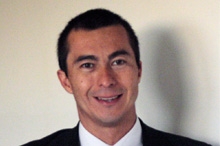A Shining Light
 Walter Meyer is being honored as a Champion of Change for the leadership he demonstrated in his involvement in response and recovery efforts following Hurricane Sandy.
Walter Meyer is being honored as a Champion of Change for the leadership he demonstrated in his involvement in response and recovery efforts following Hurricane Sandy.
The Rockaway peninsula, a small barrier island off New York City, has been a special place to me since I moved to New York with my wife and business partner, Jennifer Bolstad, in 2002. It’s a rare place where one of the greatest American cities meets the ocean; it’s the only place in the world where I can take the subway to a surf break. I taught my wife to surf and sail there, and soon I hope to teach my son the same. During the past decade we’ve spent nearly every weekend in Rockaway, and we’ve lived there from time to time, in everything from the “tear-down” summer bungalows with no heat or power, to luxury apartments in the newest developments.
We’ve built strong friendships among the community of surfers and artists, and we consider Rockaway home even though we now live a few miles away in Brooklyn.
During Hurricane Sandy, Rockaway bore the brunt of a 14-foot tidal surge topped by three-story-high waves. Restoration of electrical power to the peninsula took several weeks, and because of flood-damaged electrical panels and wiring most residences and business remained without power for nearly the full duration of the harsh winter months. The place and the people were devastated.
Power Rockaways Resilience first came together out of an impulse to heal our home in the days after Hurricane Sandy. We reached out to our network of fellow landscape architects, urban designers, sustainability experts and solar engineers – many of them also surfers with a special love for the Rockaways – to try to help in any way we could.
Two days after the storm, with the help of R. David Gibbs and Liam McGann, we delivered the first of several hand-built, shopping-cart-sized solar generators to the hardest-hit blocks of the Rockaways. Within minutes these generators were charging cell phones, laptops and small power tools to get Rockaway Beach residents connected and rebuilding while gas generators sat idle due to the region-wide fuel shortage.
Within two weeks, we were able to scale our efforts to deliver large-scale solar generators to relief centers and volunteer hubs. We partnered with Joel Banslaban of the Coastal Marine Resource Center, Stephanie Barry, Tamar Losleben and Corinne McAfee to organize a nationwide fundraising campaign and we installed solar equipment as quickly as we could get it. These small solar arrays delivered enough power to keep community-based food distribution and medical centers open after dark. The ability to plug in phone chargers and laptops allowed organizers to connect volunteers, donations and resources with people in need via phone and social media.
As power was restored and rebuilding got underway, Power Rockaways Resilience once again adapted our mission to meet the community’s changing needs. Solar generators were upgraded to permanent installations that can supplement the grid with resilient energy, while maintaining an optional battery backup to provide a renewable buffer in future storms. Our group continues to serve as an advocate for the incorporation of resilient strategies such as solar energy in the rebuilding of the Rockaways.
The use of solar to keep lights shining and helping hands working throughout the darkest days of the storm has inspired peninsula-wide interest in alternative energy technologies, and Power Rockaways Resilience is still on the ground connecting solar panel suppliers and under-employed installers with homeowners, businesses, developers and organizations seeking to rebuild for a more sustainable, resilient future.
Walter Meyer is an urban designer based in Brooklyn, New York, who helped form the community-based organization “Power Rockaways Resilience.”
White House Blogs
- The White House Blog
- Middle Class Task Force
- Council of Economic Advisers
- Council on Environmental Quality
- Council on Women and Girls
- Office of Intergovernmental Affairs
- Office of Management and Budget
- Office of Public Engagement
- Office of Science & Tech Policy
- Office of Urban Affairs
- Open Government
- Faith and Neighborhood Partnerships
- Social Innovation and Civic Participation
- US Trade Representative
- Office National Drug Control Policy
categories
- AIDS Policy
- Alaska
- Blueprint for an America Built to Last
- Budget
- Civil Rights
- Defense
- Disabilities
- Economy
- Education
- Energy and Environment
- Equal Pay
- Ethics
- Faith Based
- Fiscal Responsibility
- Foreign Policy
- Grab Bag
- Health Care
- Homeland Security
- Immigration
- Innovation Fellows
- Inside the White House
- Middle Class Security
- Open Government
- Poverty
- Rural
- Seniors and Social Security
- Service
- Social Innovation
- State of the Union
- Taxes
- Technology
- Urban Policy
- Veterans
- Violence Prevention
- White House Internships
- Women
- Working Families
- Additional Issues

